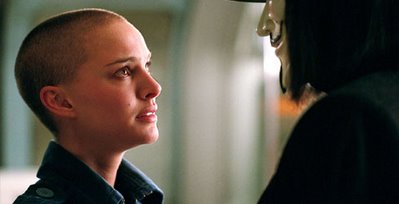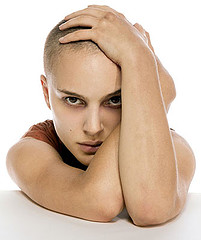DM MEETS NATALIE PORTMAN

V FOR VENDETTA (15)
reviewed by David Mahmoudieh at the UK premier
Scratching your head with your pen at some obscene hour of the night, grappling those inexorable demons of crafting an original screenplay can sometimes be about as tempting as a cold spam sandwich.
Even the most steadfast of writers – The Wachowski Brothers certainly worthy of such a mantle – who’ve tamed the beast of theirs imaginations; who’ve been there, done that and got the Oscar are quick to sidestep the labour of another ordeal of sleepless nights and a tab at Starbucks. That’s how a great writer’s tradition came about. It’s called ‘The Adaptation’.
Following up their ground-breaking trilogy, Matrix creators Larry and Andy Wachowski go auto-pilot with a screenplay-only interpretation of Alan Moore’s cult graphic novel, V For Vendetta.
Set in a fascist Britain of 2050, Hugo Weaving (most famously known for his turn as Agent Smith in the Matrix films), stars as V, a masked, cloak and daggered freedom-fighter with a sweet-tooth for chaos and a love of quoting Shakespeare. Taking it upon himself to salvage society from the ever-tightening clutches of a totalitarian regime, V enlists the help of Evey Hammond (Natalie Portman), an oppressed employee at a chancellor-ordained TV network in a bid to blow up parliament and spark a revolution that will restore power to the people.
Heralded as a fusion of ‘Batman’ and George Orwell’s disturbing novel ‘1984’, the film depicts a despondent vision of an alternative future in which Germany wins the Second World War and London is a city crippled at the hammer of Chancellor Sutler (John Hurt), a ruthless autocrat with dark, dogmatic agendas.
Naturally, such controversial subject matter has evoked an inducement of various contentious issues – the extreme even suggesting V not only encourages but glorifies terrorism. Originally wrapped and ready to roll for its premiere last November 5th, 2005 – the 400th year anniversary of Guy Fawke’s infamously vain attempt – the timing was adjudged a little too close to the bone in light of the prior London bombings in July 2005 and release was postponed, many feared indefinitely.
Scenes of The Houses of Parliament being blown to smithereens admittedly didn’t help the defence, but the film’s stars were quick to curb the negative evocation all the hype has been stirring.
“Sure, a lot’s been made of the whole terrorist thing in the film, but it’s an act of desperation [for the character] and ultimately it’s all in the name of freedom.”
But the Academy Award Nominee was only too forthcoming in explaining her attraction to such an overtly controversial role, “Being of Israeli heritage it was a great opportunity for me to delve into the way of thinking of a character who goes from hating violence to somebody who wants to use it in an expressive way. Personally, I don’t think V incites terrorist activity, if anything it exposes the sinister paths our society is heading down and is as much about self-reflection than anything else.”
© David Mahmoudieh 2006

V FOR VENDETTA (15)
reviewed by David Mahmoudieh at the UK premier
Scratching your head with your pen at some obscene hour of the night, grappling those inexorable demons of crafting an original screenplay can sometimes be about as tempting as a cold spam sandwich.
Even the most steadfast of writers – The Wachowski Brothers certainly worthy of such a mantle – who’ve tamed the beast of theirs imaginations; who’ve been there, done that and got the Oscar are quick to sidestep the labour of another ordeal of sleepless nights and a tab at Starbucks. That’s how a great writer’s tradition came about. It’s called ‘The Adaptation’.
Following up their ground-breaking trilogy, Matrix creators Larry and Andy Wachowski go auto-pilot with a screenplay-only interpretation of Alan Moore’s cult graphic novel, V For Vendetta.
Set in a fascist Britain of 2050, Hugo Weaving (most famously known for his turn as Agent Smith in the Matrix films), stars as V, a masked, cloak and daggered freedom-fighter with a sweet-tooth for chaos and a love of quoting Shakespeare. Taking it upon himself to salvage society from the ever-tightening clutches of a totalitarian regime, V enlists the help of Evey Hammond (Natalie Portman), an oppressed employee at a chancellor-ordained TV network in a bid to blow up parliament and spark a revolution that will restore power to the people.
Heralded as a fusion of ‘Batman’ and George Orwell’s disturbing novel ‘1984’, the film depicts a despondent vision of an alternative future in which Germany wins the Second World War and London is a city crippled at the hammer of Chancellor Sutler (John Hurt), a ruthless autocrat with dark, dogmatic agendas.
Naturally, such controversial subject matter has evoked an inducement of various contentious issues – the extreme even suggesting V not only encourages but glorifies terrorism. Originally wrapped and ready to roll for its premiere last November 5th, 2005 – the 400th year anniversary of Guy Fawke’s infamously vain attempt – the timing was adjudged a little too close to the bone in light of the prior London bombings in July 2005 and release was postponed, many feared indefinitely.
Scenes of The Houses of Parliament being blown to smithereens admittedly didn’t help the defence, but the film’s stars were quick to curb the negative evocation all the hype has been stirring.
During our interview before the film's London premiere, a humane and impressively rain-tolerant (she had just returned from an umbrella-less stroll in a very typical wet British day) Natalie Portman explained her attraction to the project, and why she thinks much of the film's criticism is rather misplaced.
“Sure, a lot’s been made of the whole terrorist thing in the film, but it’s an act of desperation [for the character] and ultimately it’s all in the name of freedom.”
But the Academy Award Nominee was only too forthcoming in explaining her attraction to such an overtly controversial role, “Being of Israeli heritage it was a great opportunity for me to delve into the way of thinking of a character who goes from hating violence to somebody who wants to use it in an expressive way. Personally, I don’t think V incites terrorist activity, if anything it exposes the sinister paths our society is heading down and is as much about self-reflection than anything else.”
The controversy hasn’t been the only setback. Just four weeks into filming, the actor originally cast as V – British talent James Purefoy – was replaced, bringing the production to a standstill. It took an SOS call from writers The Wachowski’s to Weaving, who knew the film’s debutant director James McTiegue from his days as Assistant Director on The Matrix. Weaving flew in the very next day to take over the lead role.
As if the production hadn’t endured enough cruel misfortune, there was more. Quite literally -- in the form of Alan Moore who seemed to have a vendetta of his own. Upon reading an early draft of The Wachowski’s screenplay, Moore – considered a World-wide legend amongst the comic-book fraternity – labelled the adaptation as “laughable” and “imbecilic”.
Getting a moment with the shy and very introverted Wachowski’s at the film's after-party, I asked why they declined directorial duties on a project they were so clearly passionate about. Larry mused, “In all honesty we felt the challenge was a little too parallel in style and message to The Matrix.”
On a more charitable note Andy added, “We love what V stands for but James (McTiegue) had a great attraction to this film and we didn’t want to stand in his way.”
Still, indisputable shades of The Matrix are rife, with bullet-time and 360 slow-mo camera movements both making their cameo. But McTiegue does well for a first-time director, never allowing the action or Weaving’s fluttering cape to overshadow the film’s albeit ironically uncompromising message of the right to freedom and the lengths individuals will go to get it.
Not sure Vendetta will be remembered as long as the 5th of November, but it’ll certainly provide a few fireworks yet.
© David Mahmoudieh 2006




0 Comments:
Post a Comment
<< Home